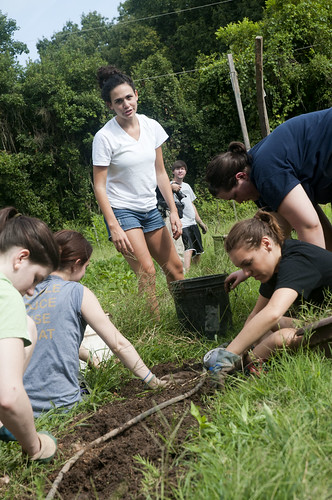Program connects students to food
 In its second year connecting new students to local sustainability initiatives, five new students participated in the Sustainability in Action Pre-Orientation program from August 22 to August 25. Participants visited sites in the community where sustainability is put into practice and connected with some of the key players in the local sustainability movement.
In its second year connecting new students to local sustainability initiatives, five new students participated in the Sustainability in Action Pre-Orientation program from August 22 to August 25. Participants visited sites in the community where sustainability is put into practice and connected with some of the key players in the local sustainability movement.
Wake Forest Fellow, Caitlin Brooks, and Office of Sustainability Intern, Carrie Stokes, served as mentors and facilitators for the 3-day program. During the program’s first full day, students explored sustainability in the Winston-Salem community. With Wake Forest alumnus and local food activist Marcus Hill serving as guide, participants toured the Werehouse — a converted warehouse that acts as a hub of local arts and culture — and the Cobblestone Farmer’s Market.
After lunch at The Screaming Rooster, a neighborhood restaurant offering fresh, local and seasonal dishes, students were introduced to the community partnership between Campus Kitchen and The Fresh Market. Finally, students ended the day at urban farm, Beta Verde, with the farm’s proprietor, slow food activist, Margaret Norfleet Neff and her daughter, Salem. Using the ingredients purchased earlier at the Cobblestone Market, students prepared a locally sourced meal in Neff’s home.
The second day of the program focused on sustainability on campus. Students worked in the Campus Garden weeding, planting and composting and were then rewarded for their hard work with an heirloom tomato tasting lead by biology professor Gloria Muday. After lunch at Shorty’s, Jim Alty, Associate Vice President of Facilities and Campus Services, led students on a campus facilities tour, highlighting the locations that support the university’s sustainability efforts. Later that evening, participants donned costumes crafted from thrift store materials and went roller skating at Skatehaven with other members of the class of 2015.
On the final day of the program, students learned about sustainable farm practices on tours of Yellow Wolf Farm, a cruelty-free, Animal Welfare Certified, protein farm, and Shore Farms, an all-organic family produce farm. Freshman Liz Stalfort even managed to befriend one of the animals. “After chasing one of Stacey’s pigs around for a while,” Stalfort recounted, “I finally figured out that the best way to befriend him was to be calm, so I was. The pig let me touch his snout twice and I was so happy.” By connecting directly with both the farmers and the animals on these farms, students gained a deepened understanding of sustainable food production.
Freshman Shoshanna Goldin called the program “phenomenal” and noted how her experience in the program has positively impacted how she sees her new community. “Throughout the program, we gained a really unique first-hand perspective of the city we plan to call home for the next four years,” Goldin said. “From meeting with the founders of local restaurants that are passionate about supporting local, sustainable farms to exploring local markets and organic farms, we took away a really valuable message – Winston-Salem has a significant number of people who care and who actively seek to engage others.”
By Jane Connors, Communications and Outreach Intern
